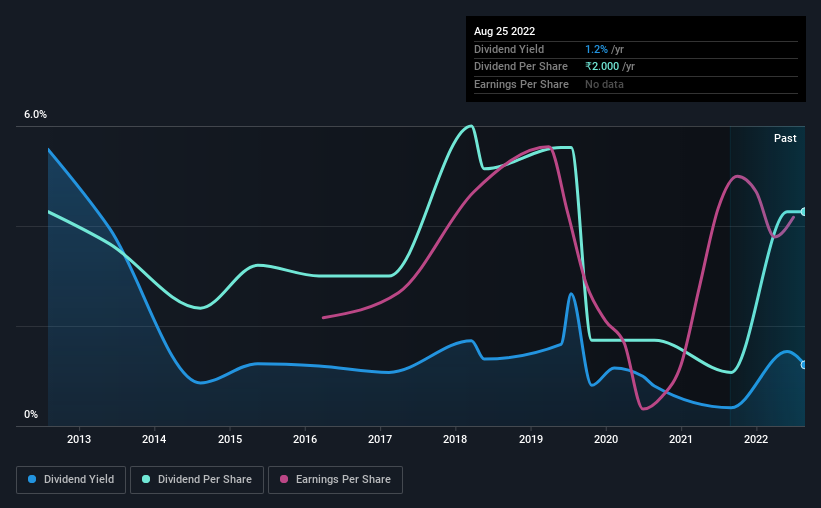NRB Bearings (NSE:NRBBEARING) Will Pay A Larger Dividend Than Last Year At ₹2.00

The board of NRB Bearings Limited (NSE:NRBBEARING) has announced that it will be paying its dividend of ₹2.00 on the 15th of October, an increased payment from last year's comparable dividend. This will take the dividend yield to an attractive 1.2%, providing a nice boost to shareholder returns.
While the dividend yield is important for income investors, it is also important to consider any large share price moves, as this will generally outweigh any gains from distributions. Investors will be pleased to see that NRB Bearings' stock price has increased by 43% in the last 3 months, which is good for shareholders and can also explain a decrease in the dividend yield.
Check out our latest analysis for NRB Bearings
NRB Bearings' Payment Has Solid Earnings Coverage
We like to see robust dividend yields, but that doesn't matter if the payment isn't sustainable. Based on the last payment, NRB Bearings was earning enough to cover the dividend, but free cash flows weren't positive. We think that cash flows should take priority over earnings, so this is definitely a worry for the dividend going forward.
If the trend of the last few years continues, EPS will grow by 9.4% over the next 12 months. Assuming the dividend continues along recent trends, we think the payout ratio could be 22% by next year, which is in a pretty sustainable range.

Dividend Volatility
Although the company has a long dividend history, it has been cut at least once in the last 10 years. The payments haven't really changed that much since 10 years ago. We're glad to see the dividend has risen, but with a limited rate of growth and fluctuations in the payments the total shareholder return may be limited.
We Could See NRB Bearings' Dividend Growing
With a relatively unstable dividend, it's even more important to see if earnings per share is growing. NRB Bearings has seen EPS rising for the last five years, at 9.4% per annum. NRB Bearings definitely has the potential to grow its dividend in the future with earnings on an uptrend and a low payout ratio.
Our Thoughts On NRB Bearings' Dividend
In summary, while it's always good to see the dividend being raised, we don't think NRB Bearings' payments are rock solid. While the low payout ratio is redeeming feature, this is offset by the minimal cash to cover the payments. Overall, we don't think this company has the makings of a good income stock.
Investors generally tend to favour companies with a consistent, stable dividend policy as opposed to those operating an irregular one. At the same time, there are other factors our readers should be conscious of before pouring capital into a stock. As an example, we've identified 1 warning sign for NRB Bearings that you should be aware of before investing. Is NRB Bearings not quite the opportunity you were looking for? Why not check out our selection of top dividend stocks.
Valuation is complex, but we're here to simplify it.
Discover if NRB Bearings might be undervalued or overvalued with our detailed analysis, featuring fair value estimates, potential risks, dividends, insider trades, and its financial condition.
Access Free AnalysisHave feedback on this article? Concerned about the content? Get in touch with us directly. Alternatively, email editorial-team (at) simplywallst.com.
This article by Simply Wall St is general in nature. We provide commentary based on historical data and analyst forecasts only using an unbiased methodology and our articles are not intended to be financial advice. It does not constitute a recommendation to buy or sell any stock, and does not take account of your objectives, or your financial situation. We aim to bring you long-term focused analysis driven by fundamental data. Note that our analysis may not factor in the latest price-sensitive company announcements or qualitative material. Simply Wall St has no position in any stocks mentioned.
About NSEI:NRBBEARING
NRB Bearings
Manufactures and sells ball and roller bearings for original equipment manufacturers in India and internationally.
Flawless balance sheet established dividend payer.
Similar Companies
Market Insights
Community Narratives




